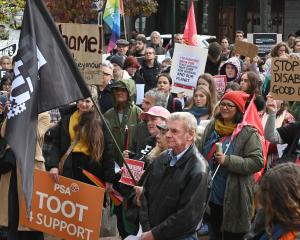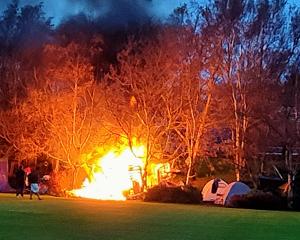This week, Mr Tofia, a history teacher at King's High School, shared his grandfather's World War 2 experience with Dunedin's younger generation, including his own 7-year-old daughter, Kate Will-Tofia.
Mr Tofia spoke at the King's High School Anzac service of the changes he had witnessed in relation to Anzac Day and what it meant for New Zealanders.
"Back then, it was a day to be avoided, when grumpy old men went out and got boozed ... Now, Anzac Day has given us a chance to fondly remember those who did their duty and sacrificed so much for us," he said.
Mr Tofia was proud to wear his grandfather's four medals and to see his daughter with them at yesterday's dawn service in Queens Gardens.
Mr Tofia's grandfather was born in Dunedin in 1914, the sixth of eight children.
From school, he worked under his father, who was the lead foreman at Speight's Brewery.
In 1939, Mr Tofia's grandfather volunteered for military service and was first stationed in Egypt, then on the Greek island of Crete.
Mr Tofia remembered him talking of the invasion by German paratroopers in May 1941.
"Granddad told me about shooting the Germans as they drifted down - that when you shot one, their hands would fall off their parachute straps and hang by their sides," he said.
"I don't know how I got this information out of him, as he usually refused to tell me about anything to do with the war," Mr Tofia said.
His grandfather was one of about 17,000 Allied troops left behind on Crete and captured by German forces.
He spent more than four years at prisoner of war camps in Germany and Poland.
"I remember stories of turnip soup and eating a cat and a wild bird, which I found very exciting as a 7-year-old," Mr Tofia said.
Like so many returned servicemen, his grandfather struggled with postwar life.
"They weren't the men they were when they left. They brought back both physical and emotional scars that people in New Zealand didn't understand."
There was little or no support or counselling for returned servicemen at the time.
"You had to get on with life as best you could - put those horrible memories behind you, store them up in a little box and protect your loved ones from them," Mr Tofia said.












